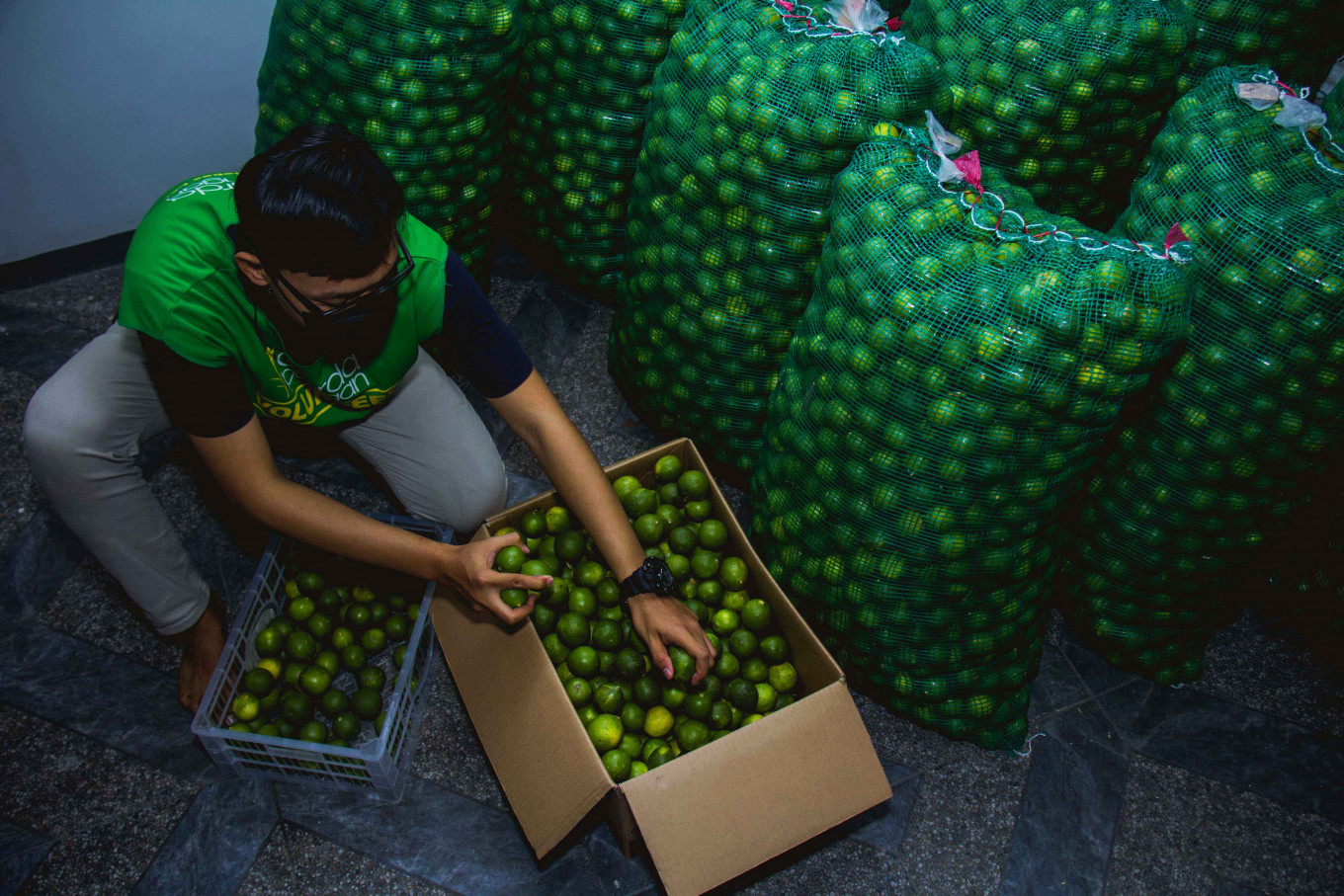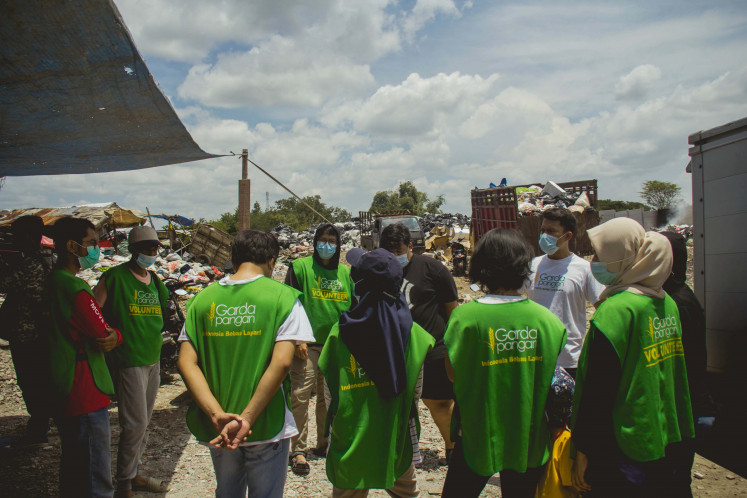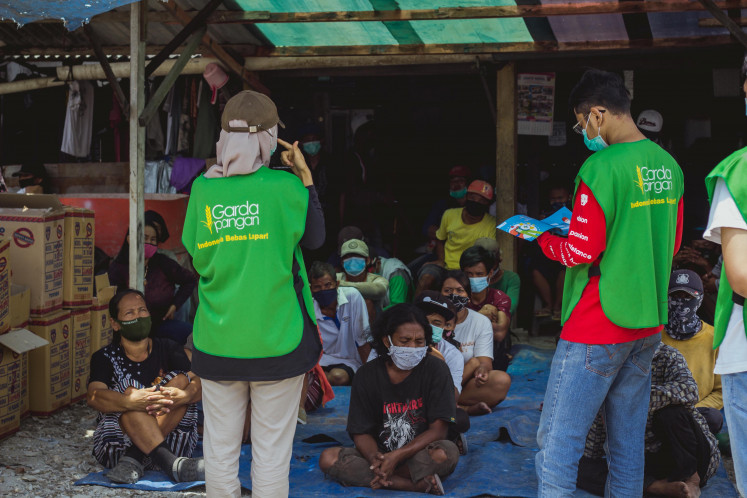Popular Reads
Top Results
Can't find what you're looking for?
View all search resultsPopular Reads
Top Results
Can't find what you're looking for?
View all search resultsIndonesia remains one of the world's worst in managing food waste: Garda Pangan wants to change that
“The absence of legal regulation also discourages companies from distributing their leftover products".
Change text size
Gift Premium Articles
to Anyone
T
he rainy season has just ended and the sun is scorching in Surabaya. Amid the piping hot air, a group of people in green vests with "Garda Pangan" emblazoned on the back walk through a kampung in the westernmost part of Surabaya, which is home to many scavengers. The village is tucked between a massive “supermall” building and acres of golf courses around. The Jakarta Post met with them as they were about to distribute groceries for people who lived among the mountains of trash around that district known as Lontar.
“We used to share foodstuff, which we recovered from a factory or leftovers from a party. But, ever since the pandemic, factories started to minimize their production quota. So, right now we will distribute groceries instead. Personal protective equipment [PPE] is also included because their job is vulnerable to COVID-19 exposure,” said Eva Bactiar, one of Garda Pangan’s founders.
The social enterprise movement has been running for almost half a decade. Garda Pangan has been actively sharing food with those who cannot afford sufficient food supplies since 2017. Before the pandemic hit, they would redistribute edible foodstuff every day. As timelessly as it seemed, Garda Pangan would keep distributing food even after midnight.
The collective adjusts its assistance to the specificity of each kampung.
"So, right before the distribution, we usually conduct an assessment of each of the targeted villages. We look at the village demographics: from age, daily routines, number of residents and so on. This is to ensure our food reaches the locals on time and enough for the whole village, also to avoid [the villagers] fighting over food." said Eva when the Post visited Garda Pangan’s food bank in Semolowaru, Surabaya.
The Garda Pangan team has 150 villages on its list for its next operation. The number continues to rise as village recommendations from the public come in. “We are open to any advice; anyone can give us a recommendation for which village we should go to,” said Eva.
Members of Garda Pangan prepare before distributing food items. (JP/Ian Def)
In 2011, a report by the Economist Intelligence Unit declared Indonesia the second-largest producer of food waste in the world. The report stated that every person in Indonesia wasted 300 kilograms of food. Earth.org also noted that Indonesians wasted at least 1.3 billion tons of food yearly - an amount that could supply food for 3 billion people.
So it’s no surprise that Garda Pangan mostly obtains its supplies from surplus left by the hospitality industry and food businesses, weddings, parties, as well as food that are nearing expiration.
The Garda Pangan team uses the organoleptic method to check each food item before redistribution. This means assessing quality by checking the flavor, odor, appearance and mouthfeel.
“If we find any change in taste, with a heavy heart we have to throw it away,” Eva said.
“That’s why we usually redistribute the food right away. We try to give food that is fresh and ready to eat. It’s not always a heavy meal, sometimes it could be just bread,” she said.
In the early days, before Garda Pangan established connections with various corporations and event organizers, it received leftovers from a catering company owned by Garda Pangan co-founder Dedhy Trunoyudho. It took some time for Garda Pangan to build its reputation and partnerships. The collective declines assistance from organizations with political and religious backgrounds.
“To maintain our independence, we’ve also done several programs to support this movement so that we do not have to depend on sponsors. We are working on a program called Lumbung Alum. We plan to make apple chips and cold-pressed juice from fruit we get directly from farmers, ” Eva said.
Helping farmers
Garda Pangan often cuts off loan sharks from buying crops from farmers at incredibly low prices, by buying the crops at a decent price. The collective also helps farmers distribute the crops to regular customers through a preorder system.
Even though Garda Pangan’s reputation has grown, Eva and her colleagues hope the local government can work on regulating edible food waste to be distributed to the poor.
Members of Garda Pangan brief villagers before distributing food supplies. (JP/Ian Def)
Garda Pangan is working to encourage corporations to officially support organizations that distribute leftover food. Eva’s team tries to assure the corporations - which are often concerned about distributing leftovers due to the dangers of food poisoning tarnishing their image - that as long as the process is handled properly, no problems are expected.
“The absence of a regulation also discourages companies from distributing their leftover products. At the same time, we also encourage a policy to ban food companies from easily getting rid of their unsold products. For example, in America, they have tax incentives. So food waste could be reduced by the existence of such a regulation,” explained Eva.
The Garda Pangan team has repeatedly held hearings with government representatives, who have not given any sign that they are on board. This hasn’t deterred Eva, Dedhy, or the rest of the team.
“We know that our journey toward the implement of a regulation is a long one. However, if we could formalize it, it could be the starting point for food waste management in Indonesia. This is not only for Garda Pangan but other similar movements will also operate easier.”













